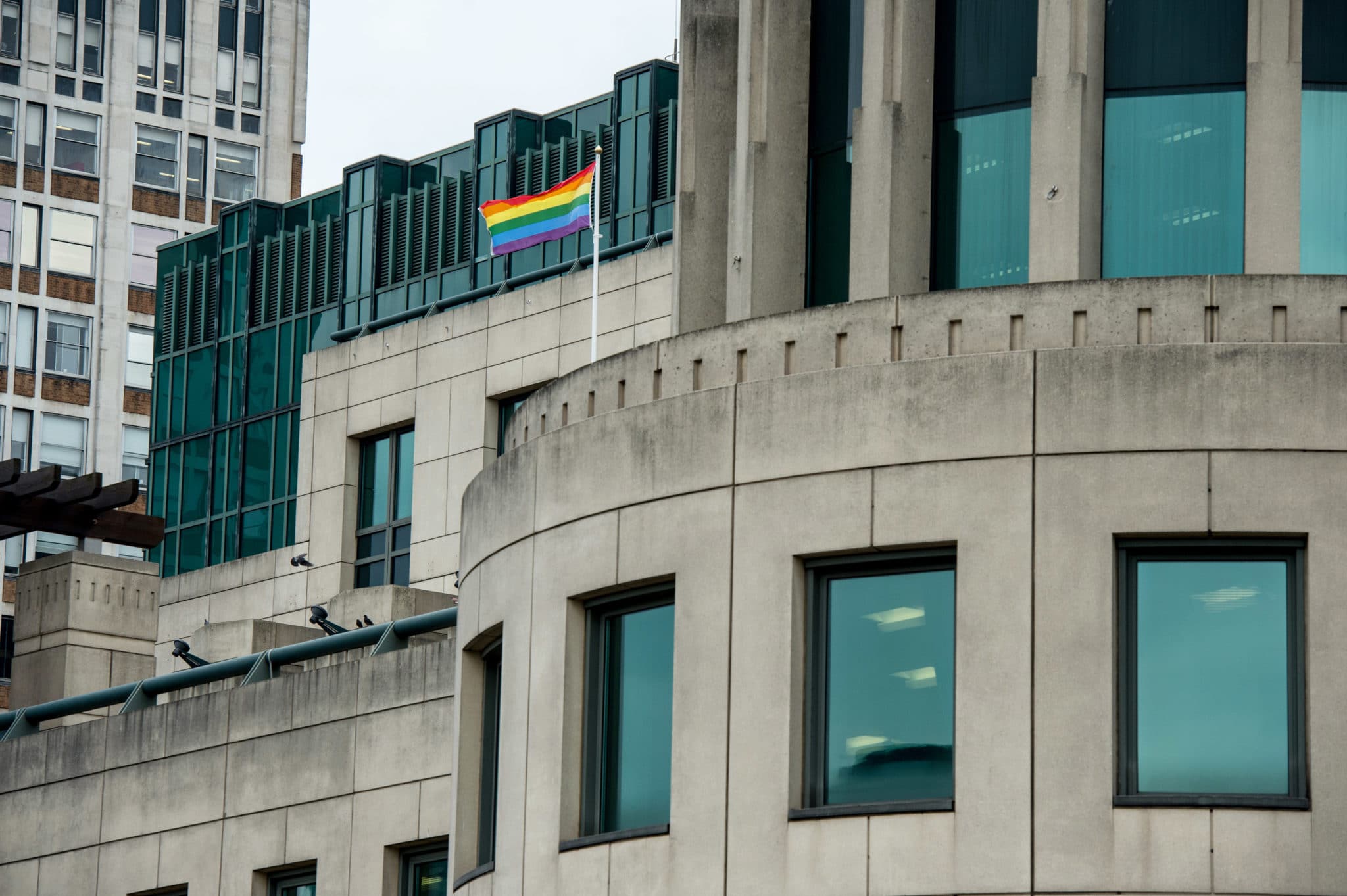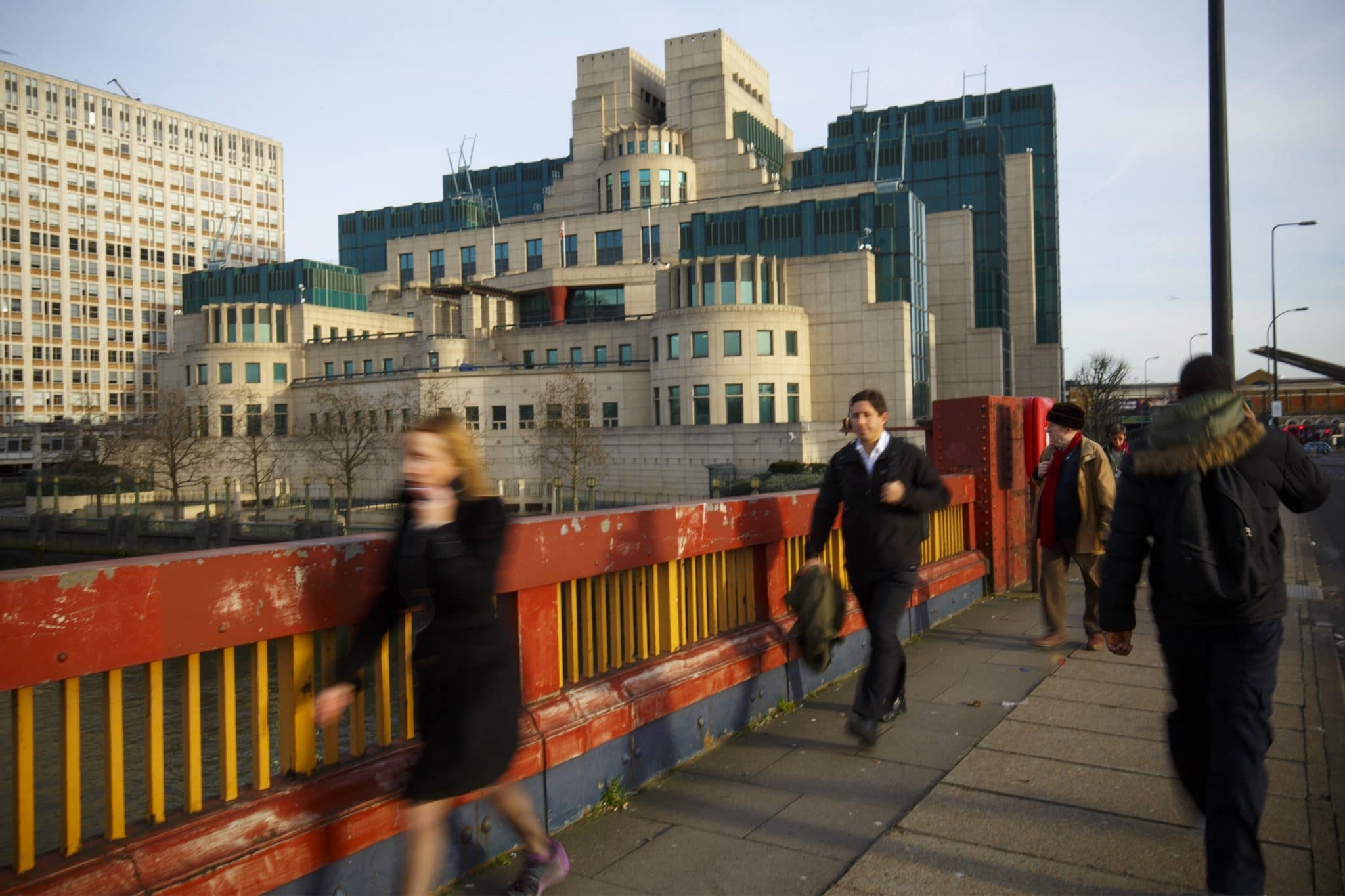Queer spies reveal homophobic legacy of MI6’s ‘illogical’ LGBT+ ban – and how far things have come

MI6 has apologised for an LGBT+ ban that forced queer spies to live in secret (Mark Mainz/Getty)
It goes without saying there are secrets among spies – but even in the innermost circles of MI6, there are some things that cannot ever be said.
A few decades ago, that included sexuality.
Up until 1991, the UK’s covert foreign intelligence service actively banned LGBT+ people under the misguided view that they were more susceptible to blackmail, making them a potential threat to national security.
It forced queer spies to live a double life in more ways than one, knowing that they would be instantly fired if they were ever found out.
MI6 finally apologised for this discriminatory policy on Friday (19 February), admitting for the first time that “secret does not mean unaccountable”.
As the secret service begins to grapple with the weight of this homophobic legacy, PinkNews spoke exclusively to two LGBT+ intelligence officers who have witnessed MI6‘s slow journey towards inclusion.
“It didn’t feel terribly safe to start with, actually,” said John, a gay intelligence officer who has served MI6 at home and abroad for 20 years.
“In those early years I was quite reticent [about being out at work], both for personal reasons and also wondering, ‘Will there be an impact on my career?’ I think many of us who joined even in the early 2000’s were just a little bit unsure about whether it was a safe space or not.”
John joined MI6 around ten years after the ban was repealed and was open about his sexuality from the start. At first he wasn’t even aware there had been a ban – but he soon came to understand the aftermath.
There was this sweeping belief that none of us could be trusted
“I spoke to colleagues who’d served during that time and heard how difficult and complicated life was for them. The emotional impact that had, how enduring it was,” he recalled.
“They talked pretty powerfully about how it felt to have to hide themselves, to have only the very smallest safe space within the office.”
That space was the LGBT+ Affinity Group, a support network within MI6. Even after the ban was lifted the group remained an “underground thing,” and most people used false names to identify themselves – an extra layer of secrecy in an already secretive organisation.
Today the group counts scores of LGBT+ people and allies among its members, including Leia, a bisexual intelligence officer who is the group’s first bi co-chair.
“I’m not sure if there was a particular point, but over time [MI6] just seemed sort of safer,” she reflected. “The office as a whole started talking about LGBT+ and diversity issues more, and the group was becoming more visible… things began to change.”
Over the years the LGBT+ Affinity Group has developed into a lively community with a strong voice advocating for change in MI6. Lately, it’s been at the centre of an emotional conversation as the belated apology for the ban sparks difficult memories.
“It makes me angry that there was this sweeping belief that none of us could be trusted. Not just that some LGBT+ people can’t be trusted, but that none of us could be trusted outright,” Leia said.
“[The discussion] is something that members of our network group have been very keen on and they welcome the apology,” she continued, “not just because it feels like it was unjust and unfair to single out LGBT+ people in the first place, but also because it fuelled homophobia in the office generally.
“I think the legacy of the ban has been unpicking that and helping people understand that LGBT+ people aren’t inherently untrustworthy, or somehow easy to blackmail, just because of who they are.”
Committed, talented, public-spirited people had their careers and lives blighted
Richard Moore, the new chief of MI6, acknowledged these lingering effects in an extensive apology which sought to make reparations for the decades of hurt.
“Committed, talented, public-spirited people had their careers and lives blighted because it was argued that being LGBT+ was incompatible with being an intelligence professional,” he said in a statement.
“Because of this policy, other loyal and patriotic people had their dreams of serving their country in MI6 shattered. This was wrong, unjust and discriminatory.”
It was also completely counterintuitive, as John noted. “What could be more likely to produce a vulnerability to blackmail than having to hide yourself away inside an organisation you desperately want to work for?” he asked. “It becomes illogical, actually, as well as morally and ethically unsound.”
Coming 30 years after the ban was lifted, Moore’s apology feels bittersweet to many: it is an uncomfortable reminder of the MI6 that was, but it’s also a testament to how far the organisation has come since.
A raft of progressive policies has seen the Secret Intelligence Service ranked among Stonewall’s top 100 LGBT-inclusive employers every year since 2016, a reflection of leaders understanding that a diversity of talent and ideas really does make MI6 more effective.
Leia and John are happy to work in an environment that is much more welcoming to queer people than it was 20 years ago, and say that the push towards equality genuinely feels like an active choice rather than a box-ticking one.
They can see real, tangible efforts towards LGBT-inclusion – from simple shared parental leave to the cryptically “creative ways” MI6 has managed to safely post LGBT+ couples to the most difficult of overseas locations.
“We all feel deeply regretful for those colleagues who suffered, who were dismissed, who never joined, or who had to hide a large part of themselves away,” John said. “But we also feel really proud that it is a great place to work for all of our people, including LGBT+ officers.
“We’re grateful we got to the point where we can make such a clear apology for the past. Because what it has done is given us confidence that this kind of thing won’t be replicated in the future.”
“It’s drawn a line in the sand,” Leia agreed, adding that for many, emotions are mixed. “Happiness that the apologies are being made, but sadness that it ever needed to be said. Sadness that the ban had ever been there in the first place.”



